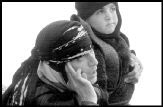THE SECOND FEATURE by Samira Makhmalbaf is a short, political movie, although it takes a long time before you realize that. Blackboards (running Friday, Jan. 31 through Thursday, Feb. 6 at the Varsity) takes place in Kurdistan, where the Iran-Iraq border means little to the Kurdish refugees and nomads eking out their hardscrabble existence. Although shot in 1999 (when the director was only 19!), the film is made topical by the likelihood of another Kurdish uprising if, as expected, we go to war with Iraq. The Kurds have been gassed, shot, and massacred by Saddam, although that violence is rendered quite tamely in Blackboards (presumably because Iranian censors won’t permit anything too graphic or disturbing).
Blackboards isn’t nearly as good a movie as Makhmalbaf’s 1998 The Apple, but it has a certain crude power. It follows two itinerant Iranian teachers, Said and Reeboir, as they lug their blackboards through rocky, mountainous Kurdistan in search of pupils. It’s a comically absurd sight, these walking chalkboards—until the sound of helicopters sends them cowering in the rocks. (Only later do we divine that Iraqi troops are venturing over the border to slaughter Kurds.)
While Reeboir forces his instruction on some reluctant Kurdish children smuggling contraband through the hills, Said hooks up with a bunch of refugees. For no apparent reason, he agrees to marry a woman with a small child, then helps guide her clan to the border. They’re a truculent bunch—mostly nonactors, I guess, who repeat their lines over and over with amateur screeching. Yet idealistic Reeboir (A Time for Drunken Horses director Bahman Ghobadi) charmingly implores the kids, “Learn to read and write. You’ll know what’s going on in the world.”
Blackboards is chiefly valuable for reminding us what’s going on in the Kurds’ almost-forgotten corner of the world—which will likely be transformed into a war zone in the months ahead. Then again, Makhmalbaf would’ve served her purpose better by making a documentary.









